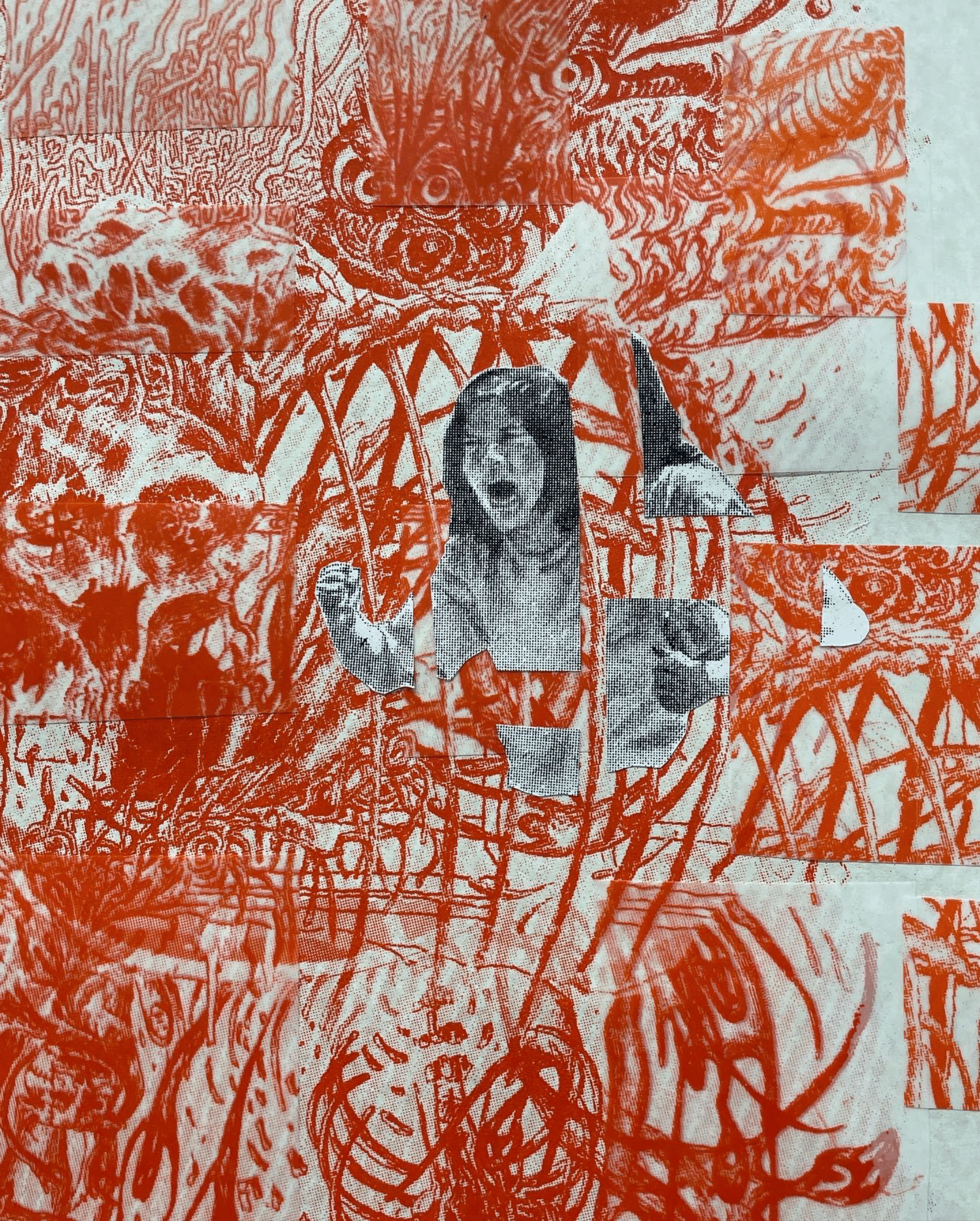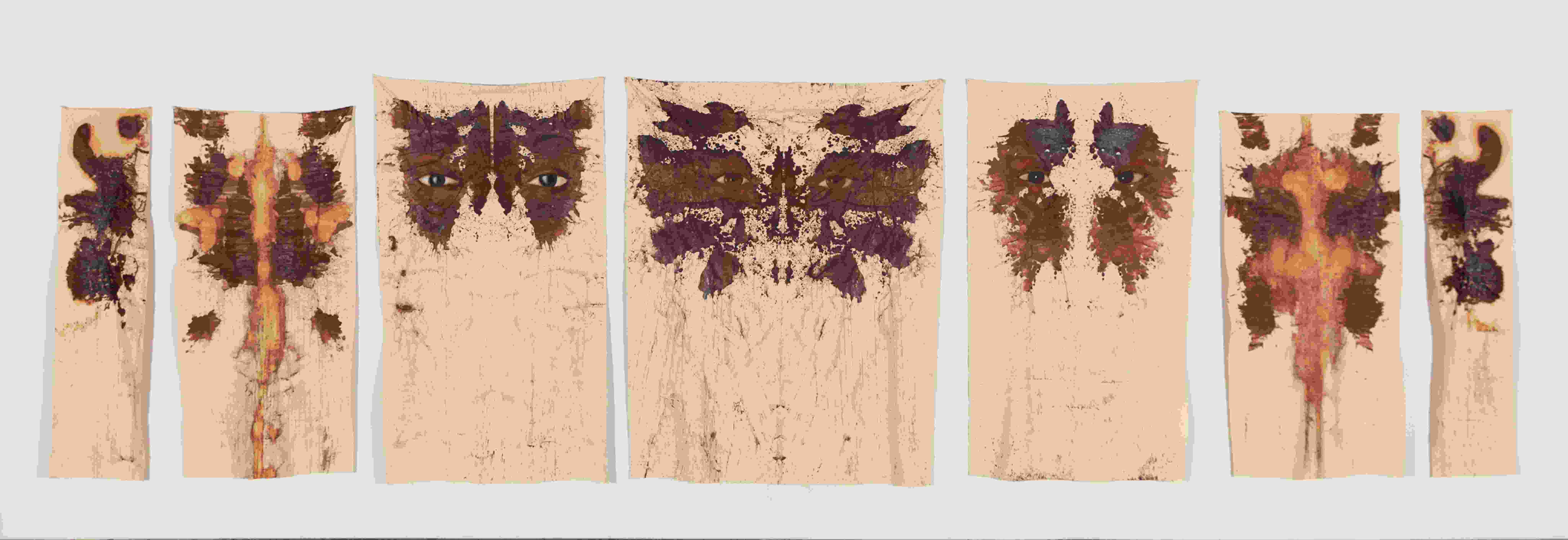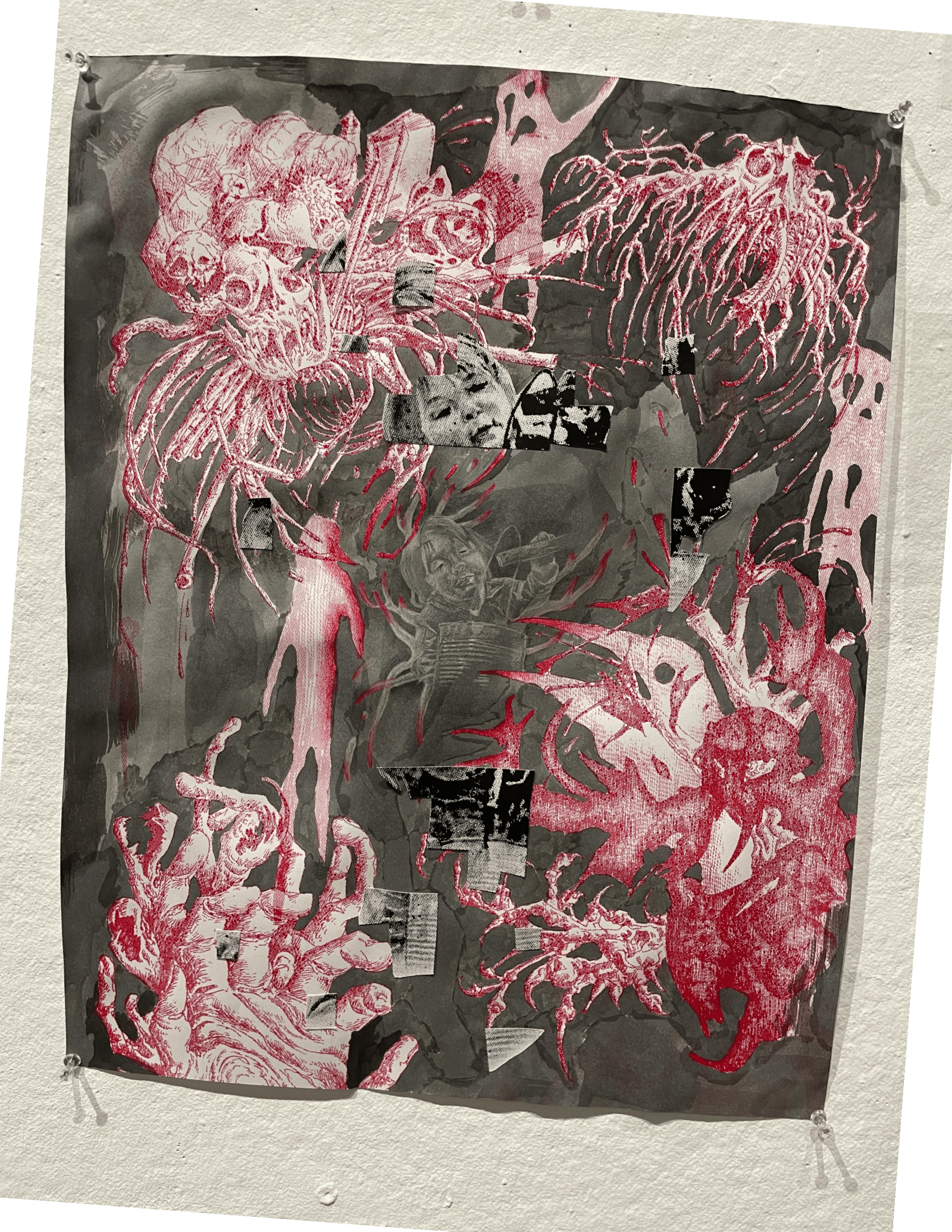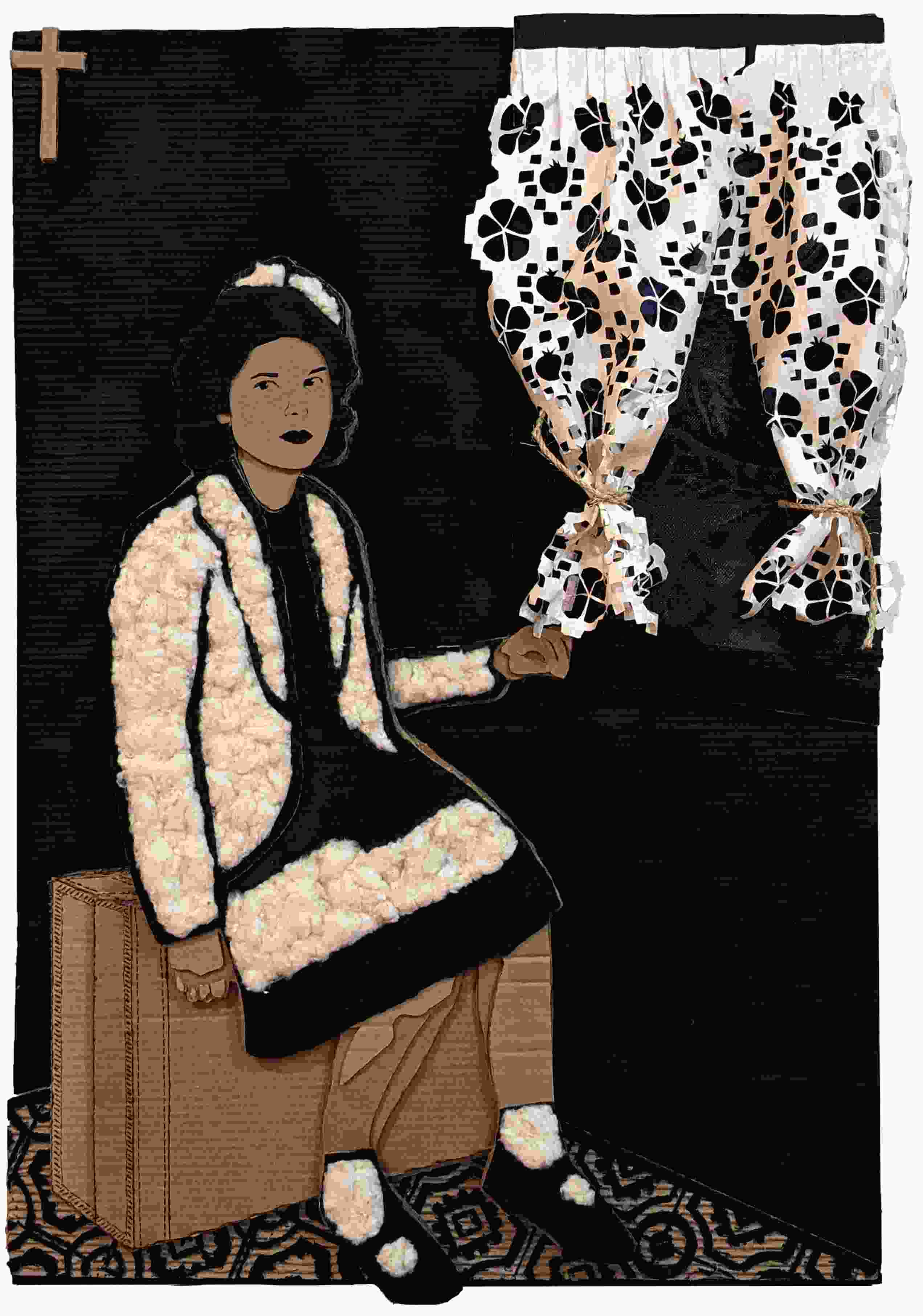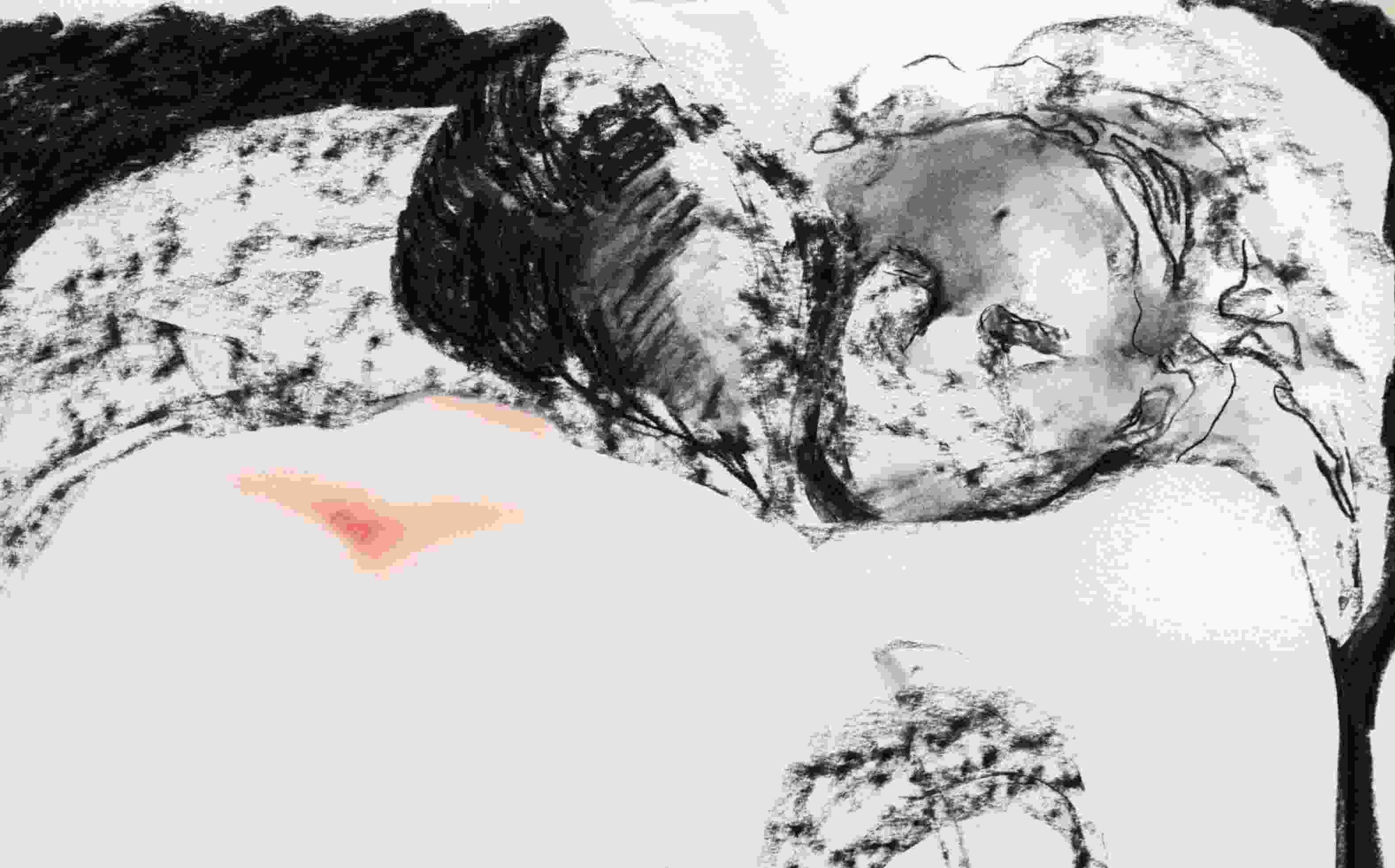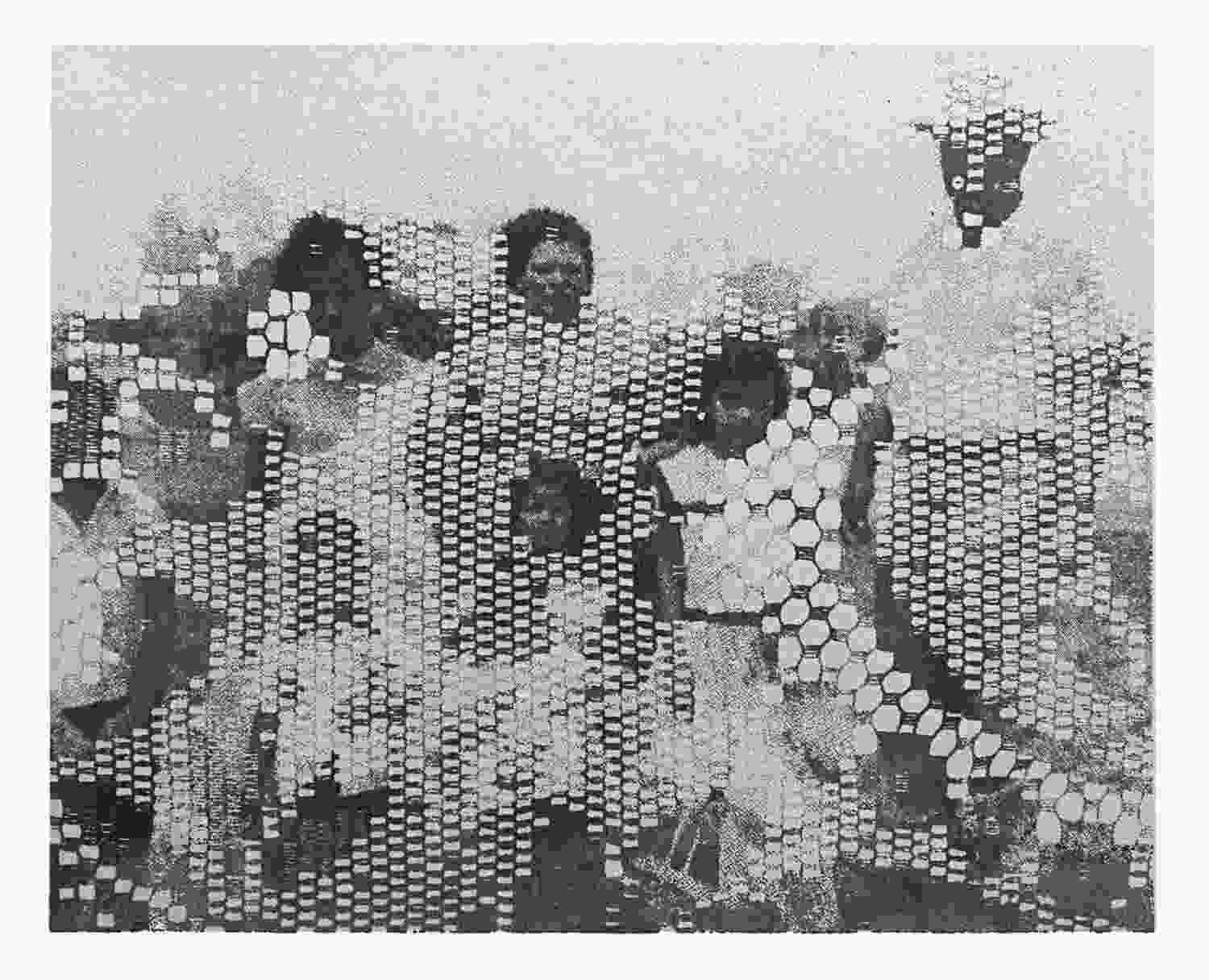Fall / Winter 2023 Issue - The Harvard Advocate
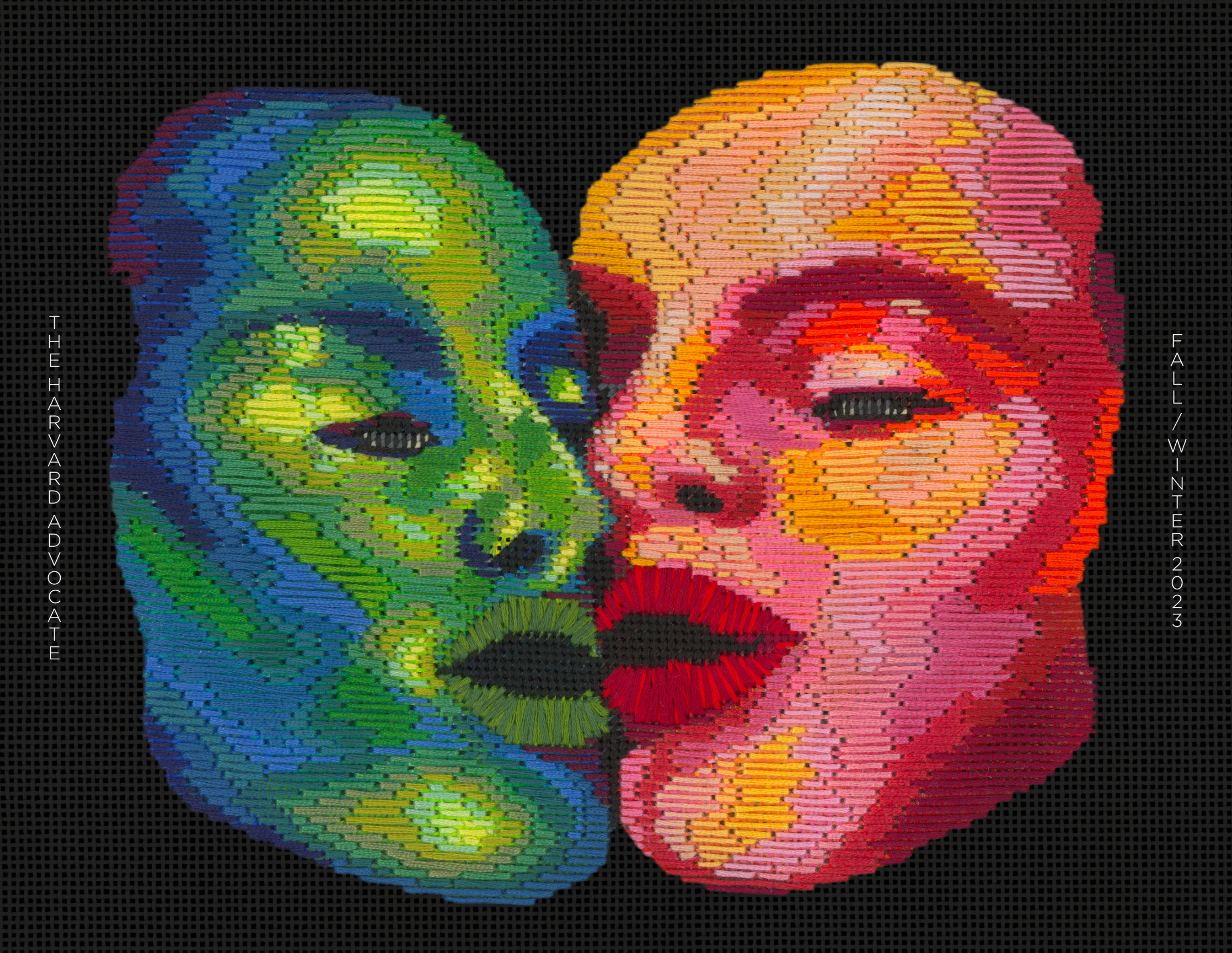
Poetry • Fall / Winter 2023
You have to understand: there was no noon, no down. Time passed. Day turned to night. I woke and slept. I drank, I ate a bit, I slept. There were few nouns. They wouldn’t connect. I didn’t know fan. I kept kicking off the blankets and pulling off my clothes. The people came and went. I didn’t know now, I couldn’t find the latches, and every few hours I found myself at baseline, staccato, returned to tonic. The light moved through its stations: soft white, blur-white, buzz-white, white-white, cream-white, cream, tan, black. My dreams were flickers, my days were smears. I slept in a mechanical bed, three feet in the air. Time and more time. The questions were confusing. I answered in song lyrics and scraps of poetry. Twenty-nine dollars and an alligator purse. It would have been funny except for the yelling. And the fear—the mind that didn’t work, the leg that wouldn’t move, the people who should have arrived but didn’t. I pitched fits; cried jags, hair-triggered—it was neurological, endless. Finally they knocked me out. They clocked me. Soft white, blur-white, buzz-white, white-white, cream-white, cream, tan, black.
Poetry • Fall / Winter 2023
I am jet fuel and six miles long. I am bad business. I make the rooms grow smaller. Underneath my shirt is another shirt and under that the cloudbanks clang their worksong. They pitch their weight in droves. This is a cold shelf, Sport. A struck bell. I gloat when I say this. I shine in the frost. You are a ham tied up in string. You are pineapples and cherries and ham on a plate at dinnertime. Fate eats you up. We rub against the facts now. My face is a glass jar. My heart is applesauce and a cold spoon. I clear the decks and spend my leverage. The rest is dazzle. You are an obstacle course and I am a pair of dice. You hop, like a rabbit, cabbage to cabbage. I win by a landslide. I smear the mirror and distort your face. You are the flipped coin and I am the outcome. I don’t decide, I collect; thumbed scale or not. You hit the ground, or so you say. You can’t unknow the facts so you run faster. You, the boy from bruised tomorrow, under the eaves where everything gets put down. I am a lamp, you are a gun. You spend your bullets on a hat, I burn when touched.
Fiction • Fall / Winter 2023
For as long as I remember, Chorip-si has been the last city beyond. We Seoul residents call it the city, a curt flash of disdain in fast-diverging conversations. Mother’s no different. Between licks at the spatula, she likes to vent that we're better off without another city far south on the peninsula, whose human civilization is down to one hell of an overcrowded capital city. It’s like having a third dimple, she says. Everything we need is right at our fingertips here, the best and only place to settle in, and why ever migrate? We have arrived. We’re home.
Fiction • Fall / Winter 2023
The last of the leftover punch was a little cloudy but still tasted about the same. Eusebia and I sat on Pete’s stoop passing the sticky Vitaminwater bottle back and forth, waiting for him to come down so we could all walk back to her place together. Pete’s apartment was a seventh-floor walkup so nobody ever climbed all those stairs on purpose. Pete himself went up and down all the time and swore it didn’t bother him. He was above-average athletic and had once been a serviceable high school tight end: not slow, not small, good engine. In the first game of his senior year he broke three ribs on a doomed passing play, his opposing defender having correctly anticipated the ball’s flightpath and time of arrival. The football landed in Pete’s chest and cradling arms a fraction of a second before the defender’s shoulder, and Pete heard the arpeggio of his ribs cracking in quick succession, click-clack-clock, top to bottom, like the opening xylophone of “Gone Daddy Gone” by the Violent Femmes, which played on a loop in Pete’s head as he lay on his back in the mud, struggling to breathe. Thus ended Pete’s athletic phase and began his phase of post-punk folk rock, which in turn ended abruptly a few years later, in a Columbus, Ohio coffee house, just as ignobly, though with less violence. There was a story about this, too. And an anecdote about moving to the city, and on becoming an artist, and so on, so that Pete’s life always seemed like a string of colorful vignettes, a series of small, brightly-lit dioramas. I have zero anecdotes, I feel like. I don’t know what I end up talking to people about. For instance just now on Pete’s stoop I was telling Eusebia about how I’d been thinking about competitive bodybuilding, how it seemed connected to conceptual poetry, but I was not yet sure how. The punch was gone and she was smoking and checking her phone and only half listening. I felt pressure building behind my eyes and ate a Sudafed of indeterminate vintage.
Fiction • Fall / Winter 2023
In a week, Scottie will break into the med tent and try to overdose on a handful of Benadryl and antidepressants. It’ll be easy for the girl — nobody will see her walk into the unguarded tent, despite the gleam her white-blonde hair will make in the Montana sun right before the flap closes behind her. No counselors or kids will pull her away as she props open the lid of the unlocked med case or pops the caps of the various pill bottles. Or when, deliriously, she stumbles past the camping tents to the creek filled with cow shit, where a kid got giardia last month, and hits her head against a stone, or tries to run away or drown herself.
Fiction • Fall / Winter 2023
First she finds a finger, tucked neatly under the pillow, slightly crooked as if in admonishment. The mother stares at it for a long moment before gingerly scooping it up and carrying it over to the shag carpet where the boy lies on his back, shadowboxing the air with all four limbs. It takes her a few tries, but by dangling a demonic plush rattlesnake in the boy’s face, she is able to distract him long enough to reattach it, peeling open his tiny clenched fist. The boy immediately starts wailing, high and thin like a faraway siren.
Features • Fall / Winter 2023
Viet Thanh Nguyen is a novelist and professor of English at the University of Southern California. His debut novel, The Sympathizer, won the Pulitzer Prize, the Dayton Literary Peace Prize, and numerous other accolades. A regular contributor to The New York Times and Los Angeles Times, Nguyen is a fellow at the American Academy of Arts and Sciences and a 2017 recipient of the MacArthur Foundation Fellowship and Guggenheim Fellowship. Most recently, Nguyen published an essay collection entitled A Man of Two Faces — an eclectic exploration of colonialism, intersectionality, and how politics, history, and identity are indelibly entwined.
Features • Fall / Winter 2023
Hua Hsu is a staff writer at The New Yorker and an English professor at Bard College. Hsu’s 2023 Pulitzer Prize-winning memoir Stay True is centered on his particular college friendship with Ken Ishida — a University of California, Berkeley undergraduate who was killed in a 1998 carjacking. In Stay True, Hsu writes about his indolent adolescence spent in the San Francisco Bay Area, and how his friendship with Ken and the aftermath of Ken’s death shaped his sense of identity.
Features • Fall / Winter 2023
Miracle No. 1: Light
March 2002 – March 2019
I am going to be broken again and again by miracles. I know this. I think I’ve known this from the moment I met the first puzzle of my life: light. So much light that the air was thick with it. I imagine that then, new and swaddled, I was thoughtless — wordless, too — completely lost in a puzzle with no boundaries or betrayals. I didn’t believe in anything then: milk, maybe. Maybe, warmth. Each moment of early life was new, each object seen exclusively for its form — the model around which meaning would one day be built. It was a time ripe with the instinct of pattern-finding. Only later would I grow into the suspicion that light might have been my first encounter with the miraculous.
Features • Fall / Winter 2023
When I was a diapered infant, my parents left Karachi because of the political situation. It doesn’t really mean much, because Pakistani politics have chronically worsened since the country’s inception. But it’s delightfully vague and one of the few things to which pontifical, mustached Pakistani men, sitting around chai and rusk, can all solemnly bob their heads in agreement.
Features • Fall / Winter 2023
I was born on the outskirts of Johannesburg, twenty years ago. The first nineteen of those years were my journey inward. I consider them unbroken years, if only because that lets me say I know a thing or two about the city. That twentieth year and the months after it have been punctured by the feeling that I know nothing about the place at all. But nineteen years is something, some time long enough for me to call the city mine.
Features • Fall / Winter 2023
Features • Fall / Winter 2023
Yiyun Li is a novelist, essayist, and professor of creative writing at Princeton University. She is the author of five novels, the most recent being the 2022 Book of Goose, a story about the friendship between two girls growing up in France post-World War II. Her collection of essays Dear Friend, From My Life I Write to You In Your Life was published in 2017. Her newest short story collection, Wednesday’s Child, was published in 2023. Her fiction has won the PEN/Hemingway award and the PEN/Faulkner award.
Features • Fall / Winter 2023
Peter Hessler is a writer and journalist from Columbia, Missouri. A regular contributor to The New Yorker and National Geographic Magazine, he is the author of three books documenting Reform China (River Town, Oracle Bones, Country Driving), a book on the Egyptian Revolution (The Buried), and an essay collection (Strange Stones). For his work, Hessler has been named a MacAuthur Fellow and a finalist for the National Book Award.
Notes from 21 South Street • Fall / Winter 2023
We know Javi is up to something, since he employs defense as offense from the start. “I wasn’t trying to play victim,” he begins, “until the world taught me what a powerful grift it is.” Thus embarks our descent into Andrew Boryga’s debut novel Victim: the satirical story of Bronx native Javier “Javi" Perez, who learns to craft – and sell – narratives around his identity in pursuit of recognition as a writer.
Notes from 21 South Street • Fall / Winter 2023
So I’m in Jamaica right now. And it’s Christmas Eve. I’m here with my mom and brother and sister. We just got dinner. Christmas Eve dinner. They serve the food at the Riu Hotel buffet-style which means waiting in line, so I was kind of annoyed with all of the 20 inch buss down wigs getting stuck in my salad and the over-enthusiastic pardon me’s from overcompensating white dads, still standing in my way. Everyone was dressed in their best red carpet looks. Red Walmart polos and green FashionNova ball gowns galore. Decent food though.
Notes from 21 South Street • Fall / Winter 2023
To Whom It May Concern:
Hi, I really want to just rest this summer, because I know for sure that this spring semester is gonna leave me with half of the desire to move and think that I currently have, but I have been highly peer-pressured into working. And no one in their early twenties can resist peer pressure – I am applying to this internship just like I might jump off the bridge if my friends do, Mom.
Notes from 21 South Street • Fall / Winter 2023
It’s winter break. Our treasured time for rotting, reunion, and fervor. And, more importantly, hedonistic consumption. These are the books essays films albums and snacks that filled The Advocate with flames in 2023. May they warm us well into the new year.
Archived Notes • Fall / Winter 2023
Ben Fry is a designer from Ann Arbor, Michigan. He is the founder of Fathom Information Design, a Boston-based design firm. Fry completed his doctoral degree at the Aesthetics + Computation Group at the MIT Media Laboratory, his postdoctoral fellowship with Eric S. Lander at the Broad Institute, and was the Nierenberg Chair of Design at the Carnegie Mellon School of Design. He has authored Visualizing Data, and co-authored with Casey Reas Processing: A Programming Handbook for Visual Designers and Artists and Getting Started with Processing. His work has appeared in the Whitney Biennial, the Cooper-Hewitt Design Triennial, the Museum of Modern Art, Nature, The New York Times, New York Magazine, Minority Report, and The Hulk. In recognition of his achievements, Fry was honored with the National Design Award for Interaction Design in 2011.
Notes from 21 South Street • Fall / Winter 2023
Two tiny women stand on the edge of a cliff, almost hidden, looking out at the oceanic expanse on the cover of Alan Murrin’s debut novel, The Coast Road. The ocean is overwhelming. These diminutive figures are Izzy and Collette, two women living in Ardglas, a small seaside town in Northwest Ireland.
Notes from 21 South Street • Fall / Winter 2023
At the beginning of All Fours, Miranda July describes two kinds of people.
“In life there are Parkers and there are Drivers,” July writes, “Drivers are able to maintain awareness and engagement even when life is boring…they get joy from petting a dog or hanging out with their kid and that’s enough… Parkers, on the other hand… need a discrete task that seems impossible, something that takes every bit of focus and for which they might receive applause.”
Notes from 21 South Street • Fall / Winter 2023
Photo courtesy of Eric Rojas.
iLe, a Puerto Rican singer and composer, joined us by phone to discuss new ways of self-expression in the pandemic, the necessity of rage, and her upcoming tour through the Northeast. This interview has been lightly condensed.
Archived Notes • Fall / Winter 2023
Ben Fry is a designer from Ann Arbor, Michigan. He is the founder of Fathom Information Design, a Boston-based design firm. Fry completed his doctoral degree at the Aesthetics + Computation Group at the MIT Media Laboratory, his postdoctoral fellowship with Eric S. Lander at the Broad Institute, and was the Nierenberg Chair of Design at the Carnegie Mellon School of Design. He has authored Visualizing Data, and co-authored with Casey Reas Processing: A Programming Handbook for Visual Designers and Artists and Getting Started with Processing. His work has appeared in the Whitney Biennial, the Cooper-Hewitt Design Triennial, the Museum of Modern Art, Nature, The New York Times, New York Magazine, Minority Report, and The Hulk. In recognition of his achievements, Fry was honored with the National Design Award for Interaction Design in 2011.
Editor's Notes • Fall / Winter 2023
The Advocate Building was erected in 1956, to much fanfare. On our ninetieth anniversary, we attached a set of pegasi wings to a white horse, affixed the poor horse to a giant dictionary, and had it chew through the ceremonial red ribbon to announce the opening of the new building. T.S. Eliot cablegrammed an ode, Donald Hall and President Pusey spoke. The onlookers applauded. “The dedication was followed by revelry,” the Crimson wrote.

